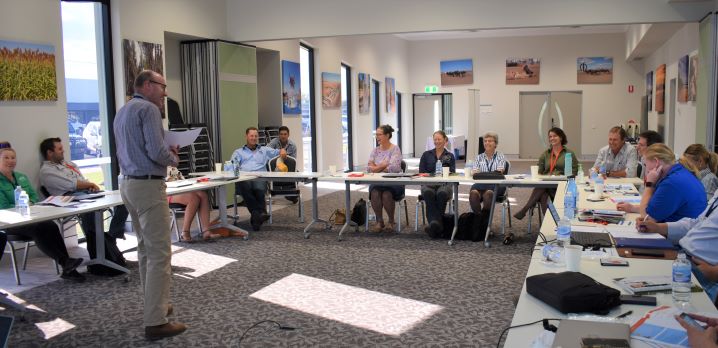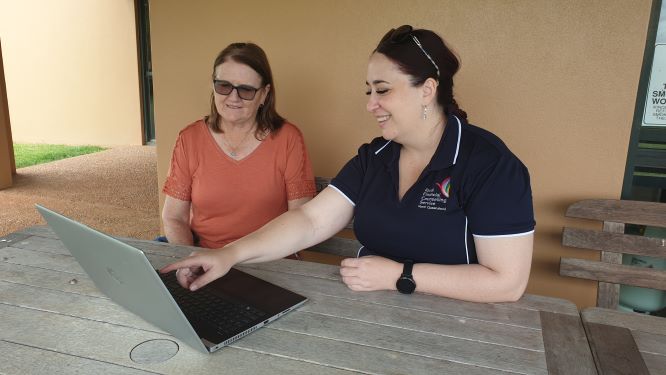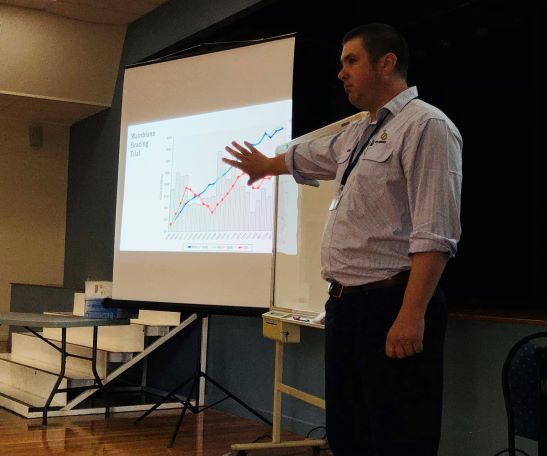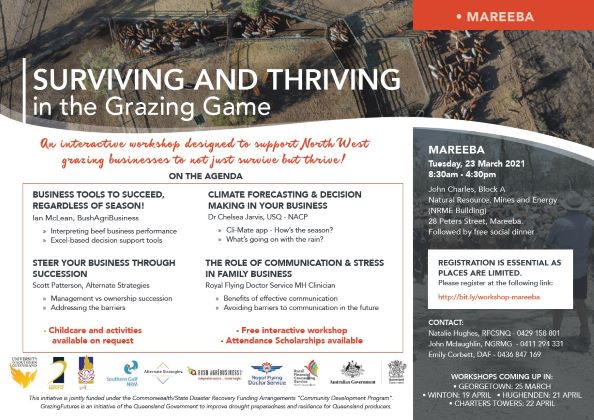From surviving to thriving in the North West
 There is much to be said by learning lessons from tough times.
There is much to be said by learning lessons from tough times.
During the devastating flood event of 2019, it became apparent to producers and extension staff from different agencies on the ground shortly thereafter, that herd recording systems and financial record keeping procedures needed improving.
Enter the Surviving and Thriving in the Grazing Game workshops.
The “Surviving and Thriving in the Grazing Game” workshops were developed in response to this need identified when producers were accessing financial assistance packages post 2019 monsoon flood event. The workshops were to be targeted business-centric workshops. Focusing on improved financial literacy and record keeping skills of beef businesses. Further discussion and brainstorming identified that skills around communication and succession planning would also be of assistance to the target audience.
The organisers teamed up with the Northern Australia Climate Program to incorporate a session regarding how to best interpret seasonal forecasts and how this can be used to effect on-property decision making.
The first ‘Surviving and Thriving in the Grazing Game’ workshops were rolled out in November 2020, for beef producers in Richmond and Julia Creek. Attending the workshops were 26 beef producers along with 10 private advisors, consultants, government and natural resource management extension officers.
Dr Chelsea Jarvis from the Northern Australia Climate Program (NACP) brought the day into focus, teaching everyone the basics of correctly interpreting Bureau of Meteorology (BoM) climate forecasts. Introducing attendees to relevant apps and sources of information was well received with an attendee rating “understanding BoM weather maps more accurately” as the most important thing they had learned from the event.

Chelsea skilfully related the forecast information to attendees as an available tool that businesses can use in conjunction with others to aid decision making. For example, ordering more lick or securing a forward contract of molasses supply if a late onset of wet season is predicted, early weaning, and when to invest money on pasture improvement or capital infrastructure purchases. She pointed out using actual examples that investing large amounts into improved pasture is best done in a La Niña year, not El Niño, for best returns.
Ian McLean from Bush AgriBusiness provided a checklist of key aspects of business performance for long-term financial sustainability. Ian walked the participants through excel based decision support tools on their laptops that they could take home to use on their own herd numbers and cashflow budgets. The importance of appropriate stocking rates to achieve maximum business performance was emphasised using results from the Wambiana grazing trial.

Royal Flying Doctor Service (RFDS) Senior Mental Health Clinician, Sharyn Bunn, spoke about communication issues and the different filters that may impede communication within a business. Simple tips and tools were discussed such as avoiding technical language or acronyms that may not be understood by others. The communication tips were relatable to everyone in the room whether they were discussing succession with family members, employer to employee relationships or personal relationships. Sharyn also discussed how stress and poor communication are often linked and the negative effects on physical health this can have. The communication section rated highly with attendees, acknowledging the importance of effective communication.
The day concluded with Scott Patterson from Alternate Strategies as he discussed business structures, management versus ownership succession, and addressing the barriers to successful succession. An interactive case study activity where the attendees were split into groups representing various members in a family business undergoing succession was a fabulous way to highlight the issues raised in succession. There was much laughter and friendly banter around the room during this session expertly led by Scott. It was terrific to see producers so engaged in an often difficult and dry topic.
The workshops were well received with 20 attendees indicating that they would make changes as a result of attending the workshop. In evaluation feedback, producers noted highlights such as the importance of early succession planning and understanding weather patterns and forecasts. Attendees commented “well balanced. Top result for a one-day seminar/workshop”, a “very well put together day – perfect follow on. Chelsea was great” and “fabulous day”.
The workshops provided economic stimulus to the local economies with all catering, workshop supplies, accommodation and an evening social dinner for attendees provided by local businesses.
Surviving and Thriving is the essence of the GrazingFutures project with successful partnering between government, non-government agencies and other partners to deliver comprehensive support to grazing businesses and value add to existing services.
An additional five workshops are scheduled for March/April 2021 to be held in Mareeba, Georgetown, Winton, Hughenden and Charters Towers. Anyone interested in attending any of these locations should contact DAF Extension Officer, Rebecca Gunther, or Rural Financial Counsellor, Natalie Hughes.
These workshops were organised by the Rural Financial Counselling Service North Queensland under the jointly funded Commonwealth/State Disaster Recovery Funding Arrangements (DRFA) “Community Development Program” and supported by the Department of Agriculture and Fisheries GrazingFutures project. GrazingFutures is part of the Queensland Government’s Drought and Climate Adaption Program (DCAP) that aims to improve drought preparedness and resilience for Queensland producers.
